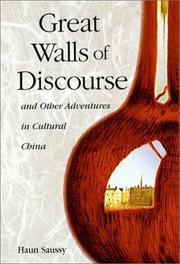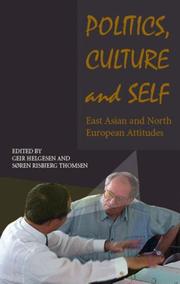| Listing 1 - 10 of 56 | << page >> |
Sort by
|
Periodical
ISSN: 23352019 23352027 Year: 2012 Publisher: Kaunas, Lithuania : [Berlin] : Vytauto Didžiojo universitetas Sciendo, De Gruyter
Abstract | Keywords | Export | Availability | Bookmark
 Loading...
Loading...Choose an application
- Reference Manager
- EndNote
- RefWorks (Direct export to RefWorks)
plurilingual competence --- interdisciplinary language sensitive teaching --- mediation --- intercultural dialogue development --- plurilingual didactics --- Multilingualism --- Multilingualism. --- Plurilingualism --- Polyglottism --- Language and languages
Book
Year: 2009 Publisher: Universitätsverlag Göttingen
Abstract | Keywords | Export | Availability | Bookmark
 Loading...
Loading...Choose an application
- Reference Manager
- EndNote
- RefWorks (Direct export to RefWorks)
This volumes deals with the presentations and debates from the guest lecture series on the occasion of the "European Year of Intercultural Dialogue" 2008 at the Göttingen University. Weltweite Globalisierungsprozesse und die Zunahme an gesellschaftlicher, religiöser, und weltwirtschaftlicher Komplexität haben die Begriffe „Interkulturalität“ und „Dialog“ nicht nur in der politischen Praxis, sondern auch in zahlreichen Wissenschaftsdisziplinen vehement an Bedeutung gewinnen lassen. Gleichwohl ist unübersehbar, dass „Interkulturalität“ bislang nur vage theoretisch fundiert ist, jedoch als Bezugspunkt für einen sich neu entwickelnden Verstehens- und Interaktionszusammenhang immer wieder in Erscheinung tritt. Genau in diese „Leerstelle“ sucht die hier dokumentierte Vorlesungsreihe zu treten, um sich aus der Perspektive unterschiedlicher, in vielerlei Hinsicht am akademischen Diskurs aktiv beteiligter Fächer mit einem „Interkulturellen Dialog“ auseinanderzusetzen. In ihrer Zusammenschau plädieren die hier versammelten Perspektiven für ein vernetztes Verstehen, das Grenzen zwischen Disziplinen, Kulturen, Religionen sowie Nationen hinter sich lässt. In den Beiträgen zeichnet sich eine Prozesshaftigkeit ab, die ausgehend von einer Hermeneutik des Fremden auf die Überwindung von Fremdheit zielt, um sich dann auf die Anerkennung der Differenz und Vielfalt von Kulturen hin zu bewegen.
Cultural pluralism --- Intercultural communication --- Multiculturalism --- Globalization --- Social aspects --- Europe --- Ethnic relations. --- intercultural dialogue --- guest lecture --- Islam --- Volksrepublik China
Book
ISBN: 9780739199732 0739199730 Year: 2015 Publisher: Lanham, Maryland : Lexington Books,
Abstract | Keywords | Export | Availability | Bookmark
 Loading...
Loading...Choose an application
- Reference Manager
- EndNote
- RefWorks (Direct export to RefWorks)
Environmentalists --- Environmental protection --- Tibetans --- Environnementalistes --- Environnement --- Tibétains --- Protection --- S02/0310 --- S24/0580 --- China: General works--Intercultural dialogue --- Tibet--Biographies --- Tibétains
Book
ISBN: 9781107053373 9781107670112 9781107282063 1107282063 9781316579695 1316579697 1107053374 110767011X 1316577481 131657850X 1316578674 1316578844 1316579018 Year: 2016 Publisher: Cambridge : Cambridge University Press,
Abstract | Keywords | Export | Availability | Bookmark
 Loading...
Loading...Choose an application
- Reference Manager
- EndNote
- RefWorks (Direct export to RefWorks)
China and Islam examines the intersection of two critical issues of the contemporary world: Islamic revival and an assertive China, questioning the assumption that Islamic law is incompatible with state law. It finds that both Hui and the Party-State invoke, interpret, and make arguments based on Islamic law, a minjian (unofficial) law in China, to pursue their respective visions of 'the good'. Based on fieldwork in Linxia, 'China's Little Mecca', this study follows Hui clerics, youthful translators on the 'New Silk Road', female educators who reform traditional madrasas, and Party cadres as they reconcile Islamic and socialist laws in the course of the everyday. The first study of Islamic law in China and one of the first ethnographic accounts of law in postsocialist China, China and Islam unsettles unidimensional perceptions of extremist Islam and authoritarian China through Hui minjian practices of law.
S02/0310 --- S13A/0500 --- China: General works--Intercultural dialogue --- China: Religion--Islam (religious aspects only) --- Islamic law --- Law --- Droit --- Droit islamique

ISBN: 0674008596 067400860X 1684173728 Year: 2001 Volume: 212 Publisher: Cambridge, Mass. : Harvard University Asia Center : Distributed by Harvard University Press,
Abstract | Keywords | Export | Availability | Bookmark
 Loading...
Loading...Choose an application
- Reference Manager
- EndNote
- RefWorks (Direct export to RefWorks)
China --- Chine --- Civilization --- Social life and customs --- Historiography --- Civilisation --- Moeurs et coutumes --- Historiographie --- S02/0300 --- S02/0310 --- China: General works--Chinese culture and the West and vice-versa --- China: General works--Intercultural dialogue --- Civilization. --- Historiography. --- History.

ISBN: 8791114993 Year: 2005 Volume: 40 Publisher: Copenhagen : Abingdon : NIAS ; Marston [distributor],
Abstract | Keywords | Export | Availability | Bookmark
 Loading...
Loading...Choose an application
- Reference Manager
- EndNote
- RefWorks (Direct export to RefWorks)
Comparative civilization. --- Political culture --- Civilisation comparée --- Culture politique --- S02/0310 --- S12/0820 --- S06/0260 --- China: General works--Intercultural dialogue --- China: Philosophy and Classics--Comparative philosophy --- China: Politics and government--The Chinese model
Book
ISBN: 9782343073149 2343073147 Year: 2015 Publisher: Paris : L'Harmattan,
Abstract | Keywords | Export | Availability | Bookmark
 Loading...
Loading...Choose an application
- Reference Manager
- EndNote
- RefWorks (Direct export to RefWorks)
L'histoire de l'universalisme en Chine et en Europe restitue les idéaux et les contradictions de ces deux visions, marquées par la difficile conciliation de leur dogme avec les constructions historiques renvoyant à l'existence du particulier. Elle montre également comment leur confrontation, au-delà des incompréhensions, a été une étape importante dans la découverte de l'altérité. ©Electre 2016
Universals (Philosophy). --- Universaux --- China --- Europe --- Chine --- Civilization. --- Civilisation --- S02/0310 --- S12/0210 --- S12/0820 --- China: General works--Intercultural dialogue --- China: Philosophy and Classics--Special philosophical subjects --- China: Philosophy and Classics--Comparative philosophy
Book
ISBN: 9781350079229 9781350078987 9781350079106 1350079227 1350078980 1350079103 Year: 2022 Publisher: London ; New York : Bloomsbury Academic,
Abstract | Keywords | Export | Availability | Bookmark
 Loading...
Loading...Choose an application
- Reference Manager
- EndNote
- RefWorks (Direct export to RefWorks)
"Portraits of Confucius presents a major collection of Western perspectives on Confucius and Confucianism, stretching from the Jesuit missions of the 16th-century to the dawn of modern cross-cultural scholarship in the early 20th-century. With selections from over 100 figures covering the 1580s to the 1950s, this two-volume work features writing from American and European sources including Benjamin Franklin, Thomas Paine, Friedrich Nietzsche, Ralph Waldo Emerson, Henry David Thoreau and Bertrand Russell. Arranged chronologically, they represent methodologies that span philosophy, political science, religious studies, sociology, anthropology, economic theory, linguistics, missionary texts, and works of popular moralism. Together they reveal important ideological trends in Western attitudes toward China-with Confucius becoming positioned at different times as anti-Christian or nearly Christ-like, while Confucianism is interpreted as something positive the West needs to adopt or as something negative that must be opposed. For scholars and students interested in the life, work and teachings of Confucius and the West's reception of Chinese philosophy, this is an indispensable reference resource"--
Confucianism. --- Philosophy, Confucian. --- Confucius. --- Confucianism --- Philosophy, Confucian --- Religions --- Konfuzius --- Kung tzu --- Kong zi --- Kongzi --- Confucian philosophy --- Philosophy, Chinese --- S02/0310 --- S12/0400 --- China: General works--Intercultural dialogue --- China: Philosophy and Classics--Kongzi 孔子 Confucius and Confucianism
Book
ISBN: 9782251452463 225145246X Year: 2022 Publisher: Paris : Les Belles lettres,
Abstract | Keywords | Export | Availability | Bookmark
 Loading...
Loading...Choose an application
- Reference Manager
- EndNote
- RefWorks (Direct export to RefWorks)
Après deux tentatives sous les dynasties Tang et Yuan, le christianisme pénètre en Chine en 1582 pour la troisième fois, suscitant un fort engouement parmi certains lettrés. Notre auteur, Xu Dashou, reçoit de son père une éducation confucéenne, puis pratique le bouddhisme. Il étudie ensuite le christianisme auprès des missionnaires jésuites et de la jeune communauté chrétienne de Hangzhou. Au décès de sa mère, il plonge dans une grave crise religieuse et familiale, qui le fait rompre définitivement avec le christianisme. Il publie ainsi en 1623 l'Aide à la réfutation de la sainte dynastie contre la doctrine du Seigneur du Ciel. La profondeur d'analyse de Xu Dashou avait attiré l'attention du grand sinologue français Jacques Gernet, qui en avait traduit de nombreux fragments dans Chine et Christianisme. Nous présentons ici pour la première fois l'ensemble du texte, avec de nombreuses annotations. Ce texte de controverse permettra au lecteur de mesurer les difficultés de compréhension que le christianisme a rencontrées en Chine. Plus profondément, ces difficultés soulèvent d'importantes questions philosophiques et théologiques entre pensées occidentale et chinoise, questions qui restent toujours d'actualité.
S02/0310 --- S13A/0905 --- S13B/0300 --- China: General works--Intercultural dialogue --- China: Religion--Interreligious dialogue:general --- China: Christianity--Nestorianism (incl. Christianity before 17th century) --- Christianity --- Christianity and other religions --- Buddhism --- Religious pluralism --- Buddhism. --- Relations --- Christianity. --- China --- Religion.
Book
ISBN: 9782213635293 2213635293 Year: 2008 Publisher: Paris: Fayard,
Abstract | Keywords | Export | Availability | Bookmark
 Loading...
Loading...Choose an application
- Reference Manager
- EndNote
- RefWorks (Direct export to RefWorks)
Y a-t-il des valeurs universelles ? Où situer le commun entre les hommes ? Comment concevoir le dialogue entre les cultures ? Pour y répondre, il nous faut suivre l'avènement du politique à partir du commun ; en même temps que remonter dans l'histoire composite de notre notion d'universel : à travers l'invention du concept, la citoyenneté romaine ou la neutralisation de tous les clivages dans le salut chrétien. Mais il conviendra également d'interroger les autres cultures : la quête de l'universel n'est-elle pas la préoccupation singulière de la seule Europe ? Il est temps, en effet, de sortir à la fois de l'universalisme facile et du relativisme paresseux : notamment, de requalifier, mais par leur versant négatif, un absolu des droits de l'homme ; de repenser le dialogue des cultures en termes non d'identité et de différence, mais d'écart et de fécondité en même temps que sur le plan commun de l'intelligible ; d'envisager ainsi ces cultures comme autant de ressources à explorer, mais que l'uniformisation du monde aujourd'hui menace. Car seul ce pluriel des cultures permettra de substituer au mythe arrêté de l'Homme le déploiement infini de l'humain, tel qu'il se promeut et se réfléchit entre elles
Philosophy and psychology of culture --- General ethics --- Rationalism --- Intercultural communication --- Rationalisme --- Communication interculturelle --- Universals (Philosophy) --- Civilization --- Philosophy --- BPB0911 --- S02/0310 --- S12/0820 --- China: General works--Intercultural dialogue --- China: Philosophy and Classics--Comparative philosophy --- Universals (Logic) --- Knowledge, Theory of --- Logic --- Scholasticism --- Whole and parts (Philosophy) --- Philosophy and civilization --- Multiculturalisme --- Civilization - Philosophy --- Différence (philosophie) --- Philosophie politique --- Relativisme culturel --- Universalisme (philosophie)
| Listing 1 - 10 of 56 | << page >> |
Sort by
|

 Search
Search Feedback
Feedback About UniCat
About UniCat  Help
Help News
News